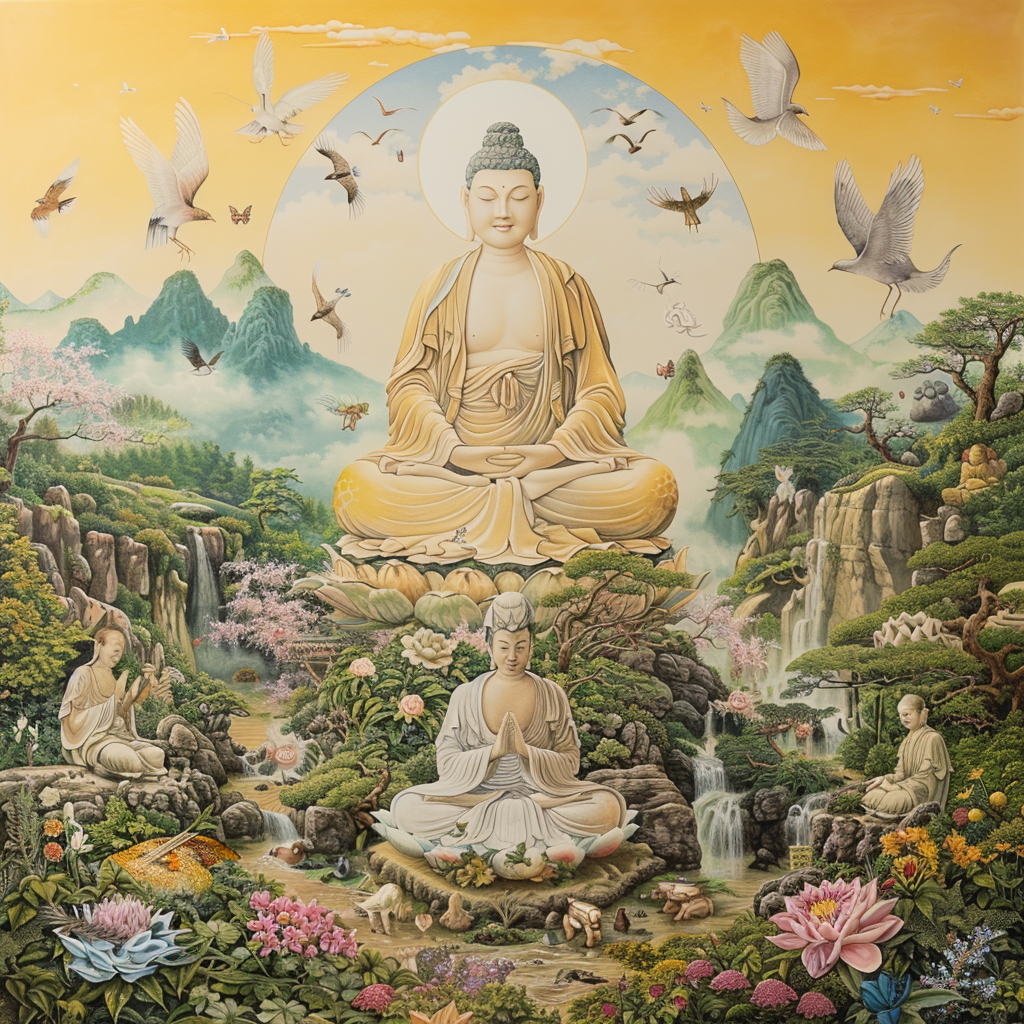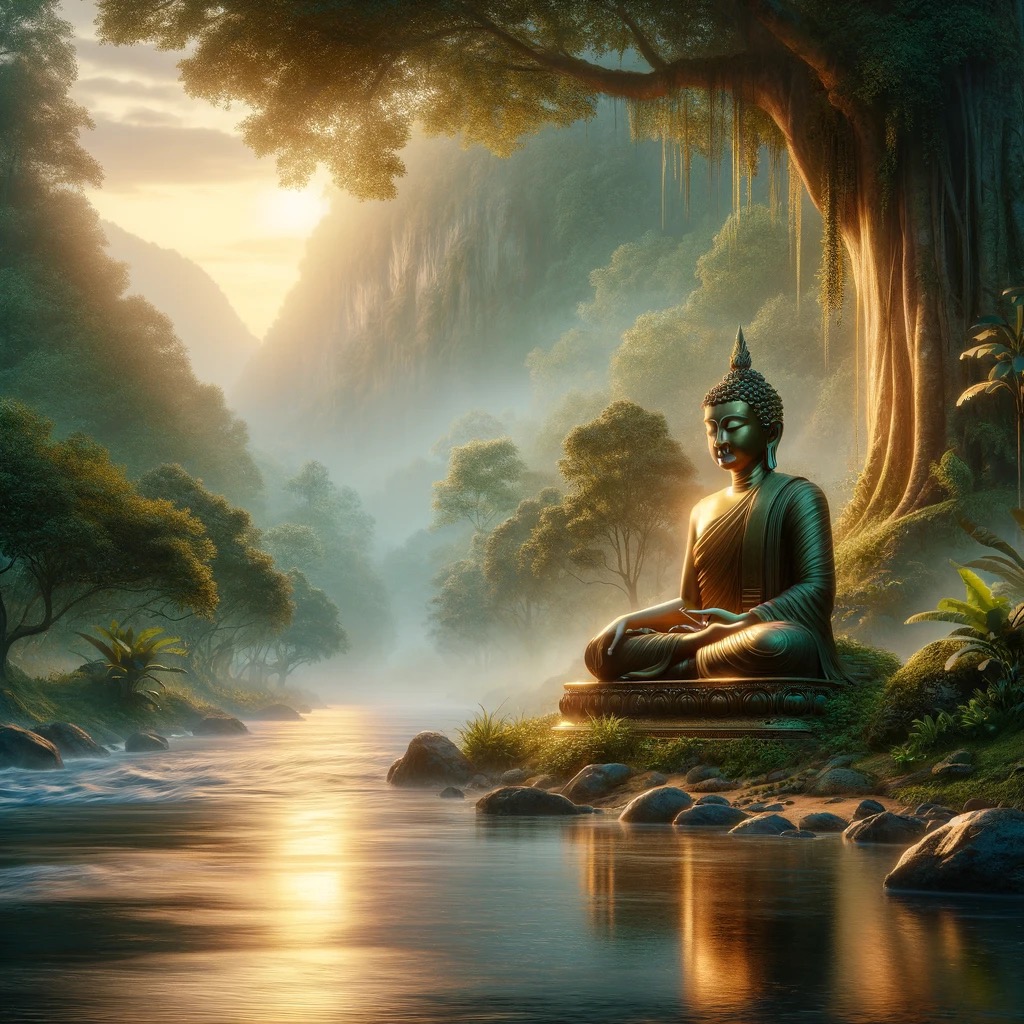Hinayana Buddhists seek enlightenment for themselves, whereas Mahayana Buddhists seek enlightenment in order to benefit others. Which approach is superior?
People pursue religious or spiritual paths for a variety of reasons, but two reasons tend to stand out.
- People see for themselves the positive results that practitioners or believers display and desire those advantages for themselves. Perhaps they encounter a Buddhist monk who exudes peace and love, or perhaps they interact with a devout Christian who lives by the teachings of Christ. When one sees the benefits first-hand, they can more easily be inspired.
- People read Scriptures or spiritual texts, and by the emotional power of the words, they become inspired to learn more about that religion or practice. I write in this forum with hope that it will inspire someone to pursue a spiritual path.

After the initial inspiration, people may embark on a spiritual path or accept baptism into a religion. They form the desire to become enlightened or accept the Holy Spirit into their heart. This process usually proceeds in four steps.
- After a new practitioner or believer learns about the benefits of spiritual practice, they are awed and decide that they want those benefits for themselves.
- Through hearing about the good qualities of the Buddha or Jesus Christ, they develop faith in them and desire to obtain those good qualities.
- On finding the thought of the decline of the teachings unbearable, they decide to become an expert in the tradition in order to spread the teachings to others.
- After seeing how rare and powerful the spirit is, they develop a desire to attain full enlightenment or accept Jesus Christ as their savior. The spiritual seeker will then set out on a path to obtain the highest realizations of their tradition.
The Prince of Peace
The term “Prince of Peace” signifies that the coming of Jesus is associated with the establishment of a kingdom characterized by peace. This peace is a profound sense of wellbeing and harmony that comes from reconciliation with God, with oneself, and with others.

In Christian theology, the peace brought by Christ is seen as twofold:
- Spiritual Peace: The inner peace that individuals experience when they are in a right relationship with God. This peace is seen as transcending worldly troubles and is often described as a peace that “passes all understanding” (Philippians 4:7).
- Universal Peace: The ultimate peace that will be established with the fullness of God’s kingdom, which includes peace among nations and peoples.
The title reflects the hope and expectation that Jesus’ life, death, and resurrection bring reconciliation and peace to those who follow him.
But how is one to obtain Universal Peace?
If a believer’s personal goals are to obtain spiritual peace on a personal level, why would they expend effort toward Universal Peace?
Trap of Peace
In Buddhism, the reason for the practitioners desire for liberation matters. In fact, two of the main branches of Buddhism are distinguished only by this desire.
Hinayana Buddhists seek enlightenment for themselves. They follow the Buddha’s teachings to obtain liberation through abandoning their delusions, and if they succeed, they are freed from cyclic existence, never to endure the sufferings of Samsara again.

Mahayana Buddhists develop Bodhicitta, the desire to obtain liberation for other people. The Mahayana path focuses on developing compassion for others, so that when a practitioner achieves enlightenment, they will work tirelessly for the benefit of others.
From the perspective of a Mahayana practitioner, a Hinayana Buddhist (or any religious practitioner who sought only personal peace) is trapped in their personal bubble of freedom.
Eckhart Tolle’s Two Years on a Park Bench
Eckhart Tolle experienced a profound spiritual awakening. He was tormented by negative thoughts and ego identification that was so strong, and so terrible, that his ego collapsed in a heap in one night, and he awoke fully enlightened.
He knew something profound had happened to him, but he didn’t know what or how, and because he had such a welcome and profound sense of peace, he didn’t care—at least not at first. He spent two years sitting on park benches quietly enjoying peace of mind.

He was trapped in peace.
He freely admits that he was so caught up on the bliss of being that he essentially checked out of society. He didn’t work, and he didn’t teach. Whatever realizations he had, he wasn’t motivated to share it with anyone because he was caught up with his own liberation and personal bliss.
The Buddha’s First Seven Weeks
Eckhart Tolle was not the first who paused to simply enjoy his first taste of peace of mind.
Records of the Buddha’s life indicate that for seven weeks following his enlightenment, he refrained from teaching others about his experience.
This hesitation is often attributed to his concern that the profound realizations he had attained might be too complex for others to grasp. There is also a credible notion that initially, he might have been satisfied with his personal state of enlightenment before choosing to disseminate his methodology to others.
The Buddha may have been trapped in peace.

This idea that the Buddha was trapped in peace seems more human and realistic, though it might cast a more modest light on his initial motivations. Nevertheless, once he resolved to impart his knowledge, he delivered an impressive 84,000 teachings, wholeheartedly committing to altruistic service thereafter.
The Buddha was emphatically human, and he consistently rejected any claims of divinity, despite some people venerating him as a god. Acknowledging his humanity and the possibility that his quest for enlightenment was initially driven by personal desire does not detract from his stature or his achievements.
Indeed, he attained enlightenment and then dedicated his life to guiding others on how to reach the same state. His legacy is certainly one that merits admiration and imitation.
Compassionate Living
The term often used for Christian compassion is “agape” (pronounced ah-gah-pay), which is ancient Greek for unconditional, selfless love. Agape is distinguished from other types of love by its moral and spiritual dimension; it represents the highest form of love, the love of God for man and of man for God, and extends to the love for one’s neighbors.
In Christian theology, agape is considered the love that seeks and works for the best interest of others without expecting anything in return, mirroring the love and compassion that Jesus Christ showed to humanity.

The Mahayana path of Buddhism is devoted to the cultivation of compassion as a path to enlightenment. It’s based on Scripture describing the seven causes and effects.
- Perfect buddhahood arises from the desire to obtain enlightenment.
- The desire to obtain enlightenment arises from a wholehearted resolve.
- The wholehearted resolve arises from compassion.
- Compassion arises from love.
- Love arises from the wish to repay the kindness of others.
- The wish to repay the kindness of others arises from recognizing and recollecting their kindness.
- The recognition of the kindness of others arises from recognizing all beings as your mother in a previous life.
Tibetan Buddhist Lamrim: Remembering the Kindness of All Living Beings
Tibetan Buddhist Lamrim: Recognizing That all Living Beings Are Our Mothers
Tibetan Buddhist Lamrim: Developing Equanimity
Because Mahayana Buddhists use compassion as their motivation for practice, after they obtain enlightenment, they do not become trapped in peace. Instead, they work continuously for the welfare of other beings.
The Buddha and Eckhart Tolle both became trapped in peace for a time after their enlightenment. Both escaped the trap and spread their teachings far and wide.

While no one should fault those who spend their lives in peace, I for one and thankful to those who instead devoted their time and energy to teaching others. Without them, I would still be lost and suffering with no idea how to overcome my plight.
